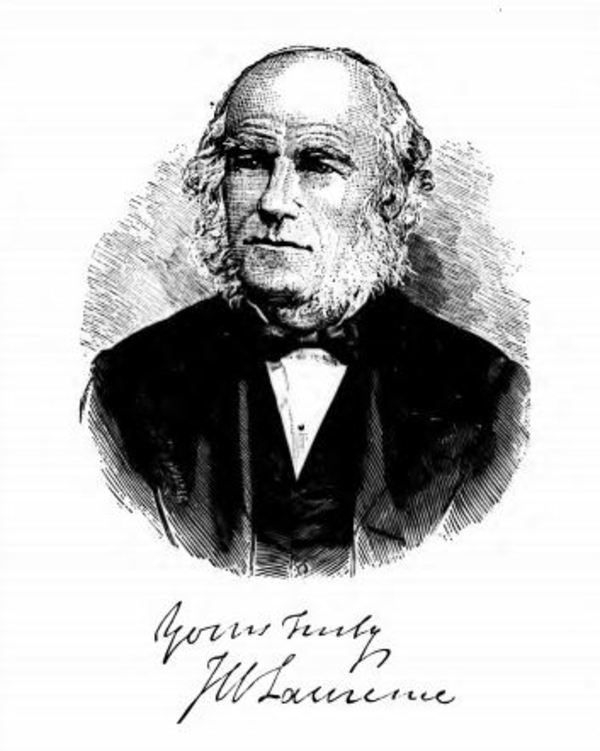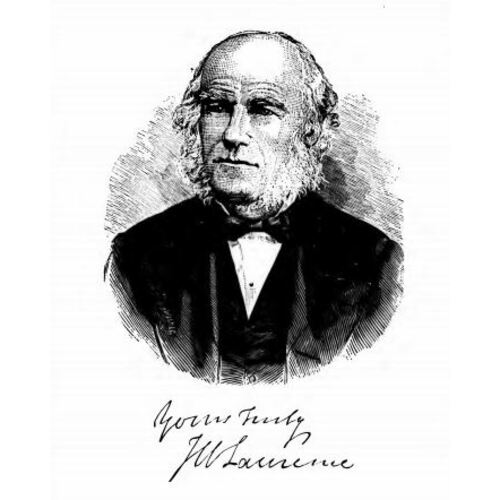
Source: Link
LAWRENCE, JOSEPH WILSON, furniture manufacturer, undertaker, politician, office holder, and historian; b. 28 Feb. 1818 in Saint John, N.B., son of Alexander Lawrence* and Mary Wilson; m. 10 June 1846 Anna C. Bloomfield in New York City, and they had at least three sons and two daughters; d. 6 Nov. 1892 in Saint John.
There was nothing in Joseph Wilson Lawrence’s family background to presage his pioneering role in New Brunswick historiography. His father arrived at Saint John from Scotland in 1817, to become one of the colony’s notable cabinet-makers. After the elder Lawrence’s death in 1843, sons Joseph and George Hunter continued the enterprise, distinguished from their father’s by its larger scale and the fineness of the furniture carving. The business name did not finally disappear until 1896. In connection with the furniture manufactory, the Lawrences ran a leading Saint John undertaking establishment.
Lawrence’s public career was bound up with that of his sometime intimate, Samuel Leonard Tilley. In 1835 the two were co-founders of that nursery of upward political mobility, the Young Men’s Debating Society. At Tilley’s 1839 conversion, Lawrence joined him in becoming an Anglican Sunday school teacher. The year following they took together the total abstinence pledge. Tilley journeyed with Lawrence to New York in 1846 for the latter’s wedding and named Lawrence an executor of his first will. When Tilley had to be absent from nomination-day proceedings at the time of his political debut in 1850, it was Lawrence he chose to speak as his proxy.
Yet when Lawrence himself entered politics, at the general election of 1854 in the two-member constituency of Saint John City, he did so in opposition to Tilley. In the world of Saint John politics on the eve of party government his decision to run as an independent candidate against his Liberal friend need not signify a political falling out; but in the “prerogative” election of 1856 Lawrence contested the riding in defence of Lieutenant Governor John Henry Thomas Manners-Sutton*’s decision to force an election in hopes of overturning the province’s prohibition law. In so doing Lawrence ran in direct opposition to Tilley, who was not only a member of the ousted government but the chief promoter of legislated prohibition. This time Lawrence was victorious and he entered the assembly a supporter of John Hamilton Gray*’s short-lived Conservative government. On the occasion of its impending defeat in March 1857 he had his most celebrated moment in the house. Amid scenes of great disorder the impassioned and rather deaf Lawrence held the floor for an hour denouncing the critics of the government and delaying business until Manners-Sutton could arrive to prorogue the assembly and thereby prevent the humiliation of the government on a want-of-confidence motion. At the ensuing general election Lawrence lost his seat and he was again unsuccessful when he opposed Tilley’s ministerial by-election later that year. In 1858 Lawrence returned to the house in a by-election but he lost in the general campaigns of 1861 and 1870.
Like most New Brunswickers Lawrence opposed the scheme for colonial union that came out of the Quebec conference in 1864, and he took an active speaking role in the successful campaign to defeat Tilley’s government at the “confederation” election of 1865. During the ill-starred anti-confederate administration of Albert James Smith*, he served as chief commissioner of railways. When Tilley’s party returned to power in 1866, it demanded Lawrence’s dismissal, though he had taken no part in politics following his appointment. Lieutenant Governor Arthur Hamilton Gordon* at length sacrificed him to avert a constitutional crisis. Lawrence accepted appointment from Alexander Mackenzie’s federal Liberals to a commission on the feasibility of a canal across the Chignecto Isthmus at Baie Verte – his minority report, published in 1876, advocated the scheme – but he remained convinced as late as 1885 that confederation had been a “mistake” and a “failure” so far as the Maritime colonies were concerned.
In the 1870s Lawrence began the historical researches that would dominate the rest of his life. Although his interests were conventional – the Church of England in Saint John and the medical, legal, and journalistic professions – he was the first New Brunswicker to pursue original research on a fairly broad front. Entrusted at the death of Senator Robert Leonard Hazen* with a remarkable collection of papers of Ward Chipman* Sr and Ward Chipman* Jr and anxious to raise public consciousness of the value of New Brunswick history, Lawrence took up the habit of presenting documents from the collection to those he thought might fancy them. He was founding president of the New Brunswick Historical Society, set up in 1874, and, though not himself of loyalist descent, chief organizer of the highly successful loyalist centennial commemoration of 1883. For the latter event he published a well-illustrated volume of loyalist vignettes that established him in the public eye as the principal authority on New Brunswick’s past.
Lawrence’s enduring reputation rests on the series of biographical studies published posthumously as The judges of New Brunswick and their times. Begun in 1874, it was in its conception the first full-length work on New Brunswick history. By summarizing the careers of the 20 judges appointed to the Supreme Court from the commencement of the province until 1867 – notably George Duncan Ludlow*, Edward Winslow*, the Chipmans, and Lemuel Allan Wilmot* – Lawrence would provide a political (not a legal) history across nearly a century. In choosing a “life and times” format he catered to the biographical obsession of the Victorian public while making minimal demands on his modest ability to organize material. Lawrence based his work to a great extent on primary sources, especially the Chipman papers, the lieutenant governors’ official correspondence, and the collection of early Saint John newspapers to which he had access as long-time librarian of the Mechanics’ Institute.
Lawrence’s talent was that of a busy fact-gatherer rather than that of a narrative historian. At his death in 1892 he left a bewildering variety of draft judicial biographies in his characteristically disjointed style and “painfully crabbed hand,” but nothing his literary executor, Alfred Augustus Stockton*, could readily put into print. It was not until 1904 that journalist David Russell Jack* prevailed on Stockton to prepare the biographies for serialization in Acadiensis. Stockton chose to leave Lawrence’s texts largely intact while adding copious end-notes, often deriving from work by William Odber Raymond* on the papers of Edward Winslow, which had been unavailable to Lawrence. When Stockton died in 1907 it fell to Raymond to write the final four biographies and thereby bring the 30-year saga of Judges to a workmanlike conclusion. The book was published in Saint John in 1907.
During the last 20 years of his life Lawrence, severely deaf and obsessed by his political failures and financial reverses, became decidedly odd. One has a sense that sometime associates such as Tilley, Senator John Boyd, and George Edward Fenety publicly extolled his historical work in indirect acknowledgement that Lawrence’s talents had fitted him for a local greatness which the vicissitudes of party politics had denied him. Though his contemporary reputation as a historian was exaggerated and though his grand conception of a general political history told through the lives of the judges was brought to fulfilment belatedly and only through the efforts of others, Lawrence’s was the pioneering role in raising public awareness of New Brunswick history. He prepared the way for a number of distinguished amateur successors already active by the time of his death, notably W. O. Raymond and James Hannay*.
[Joseph Wilson Lawrence’s Judges of N.B. originally appeared as a series of appendices to Acadiensis (Saint John, N.B.), 5 (1905)–7 (1907); the 1907 monograph volume was reprinted with an introduction by D. G. Bell in Fredericton in 1985. In addition, Lawrence wrote a small number of articles and three other independent monographs, all published in Saint John: A letter on the Intercolonial Railway, to the Hon. William McDougal . . . (1867); A minority report on the proposed Baie Verte Canal, 1876 (1876); and Foot prints; or, incidents in early history of New Brunswick, 1783–1883 (1883).
Lawrence’s most enduring contribution to New Brunswick historiography, however, was saving the Chipmans’ papers, which contain, in turn, an important admixture of Hazen family documents. Despairing of their fate, Lawrence wrote to Tilley in 1890, “As to who is to get my old historic relics I know not, for none of my family give them room.” Part of these papers, together with those discovered by W. O. Raymond, are now at the NA as the Lawrence coll. (MG 23, D1, ser1); the other major part are at the N.B. Museum, chiefly as the H. T. Hazen coll.: Ward Chipman papers.
Papers which passed through Lawrence’s hands are readily identifiable by his characteristic scrawl (“hoof marks” in Raymond’s words) on the dorse. Hence one can infer that a substantial portion of the Jonathan Sewell papers (NA, MG 23, GII, 10) were extracted by Lawrence from the Chipman papers and given to G. W. Sewell. Similarly, the otherwise obscure unifying principle underlying the collection of late-18th-century manuscripts known as PANS, MG 1, 164C, is that it is a set of Nova Scotia autographs which Lawrence drew from the Chipman correspondence to present to Thomas Beamish Akins.
Lawrence’s own surviving papers, though substantial in bulk, are of poor quality. The Lawrence coll. at the NA includes several dozen notebooks containing draft chapters for Judges and other historical notes, as well as material on his railway and canal enthusiasms. The most interesting part of this collection is the file of personal correspondence (vol.80), chiefly on the painful evolution of Judges. Lawrence’s papers at the N.B. Museum include the draft of his 1885 memoir, “Some reminiscences, Hon. Sir Leonard Tilley and J. W. Lawrence, 1835–1885” (A313), scrapbooks, historical notebooks, and business account-books. As well, there is a small file of correspondence regarding Foot-prints in the H. T. Hazen coll., and some Lawrence letters in the Tilley family papers. d.g.b.]
NA, MG 27, I, D15. N.B. Museum, Barnhill, Ewing & Sanford papers, box 9; Confederation, cb doc.; St Andrew and St David United Church (Saint John), St Andrew’s Presbyterian Church, reg. of baptisms and marriages; A. McL. Seely papers. New Brunswick Hist. Soc., Loyalists’ centennial souvenir (Saint John, 1887). Daily Telegraph (Saint John), 21 Aug 1885. St. John Daily Sun, 5 May 1882; 6, 9 Jan. 1890. Saint John Globe, 10 Nov. 1886, 7 Nov. 1892. Elections in N.B. C. H. Foss and Richard Vroom Cabinetmakers of the eastern seaboard: a study of early Canadian furniture (Toronto, 1977). H. G. Ryder, Antique furniture by New Brunswick craftsmen (Toronto, 1965).
Cite This Article
David G. Bell, “LAWRENCE, JOSEPH WILSON,” in Dictionary of Canadian Biography, vol. 12, University of Toronto/Université Laval, 2003–, accessed January 9, 2026, https://www.biographi.ca/en/bio/lawrence_joseph_wilson_12E.html.
The citation above shows the format for footnotes and endnotes according to the Chicago manual of style (16th edition). Information to be used in other citation formats:
| Permalink: | https://www.biographi.ca/en/bio/lawrence_joseph_wilson_12E.html |
| Author of Article: | David G. Bell |
| Title of Article: | LAWRENCE, JOSEPH WILSON |
| Publication Name: | Dictionary of Canadian Biography, vol. 12 |
| Publisher: | University of Toronto/Université Laval |
| Year of publication: | 1990 |
| Year of revision: | 1990 |
| Access Date: | January 9, 2026 |



